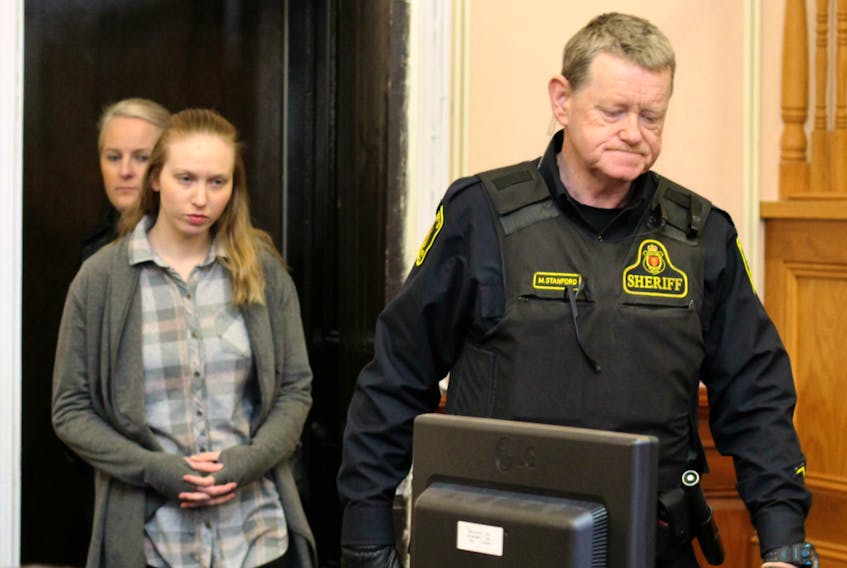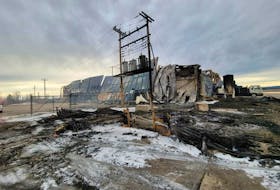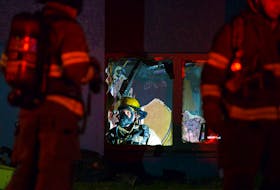Anne Norris was delusional at the time she killed Marcel Reardon, forensic psychiatrist Dr. Nizar Ladha said Wednesday, but she wasn’t delusional about the consequences of hitting him in the head with a hammer.
Ladha was on the witness stand at Norris’s murder trial for a third day Wednesday, as Crown prosecutor Iain Hollett continued his cross-examination.
“She intended to hit him with the hammer, and she intended to hit him with the hammer until he was dead?” Hollett asked Ladha.
“That’s what she told me, yes,” Ladha replied.
Ladha has told the court he believes Norris was in a psychotic state the night of May 8, 2016, when she killed Reardon by striking him multiple times in the head with a hammer and moved his body underneath a set of concrete steps.
Related stories:
St. John’s court hears more of Anne Norris’s account of the night she killed Marcel Reardon
Anne Norris wanted backpack sunk in St. John’s harbour, witness testifies
Podcast: Tara Bradbury covers the Anne Norris murder trial
Ladha, who was hired by defence lawyers to assess Norris’s mental health, said he believes she has schizophrenia, was untreated and delusional that night, and killed Reardon because she felt it was the right thing to do.
Over the past three weeks, the court has heard evidence of Norris suffering from years of delusions centred on people sexually assaulting her as she slept. Ladha said she told him during one of four meetings they had between June 2016 and December 2017 that she believed Reardon was planning to break into her apartment and sexually assault her the night she killed him. She was overcome by anxiety and psychosis, the psychiatrist concluded, and killed him in an effort to protect herself.
During the interviews, Norris laughed inappropriately and showed no symptoms of anxiety or psychosis, Ladha said,
Taken on their own, many of Norris’s statements and actions might seem like those of a cold-blooded killer, Ladha told the court Wednesday, but put in the context of her mental health history, they reveal evidence of a psychotic disorder.
He pointed to other things Norris did that night — such as taking a friend with her to the waterfront when she got rid of the weapon and moving Reardon’s body to a place where it was only partially hidden — as evidence she didn’t fully grasp what she was doing.
“A seasoned criminal wouldn’t do that kind of stuff, in my opinion,” Ladha said.
Hollett mentioned a number of incidences where Norris had lied to police, and pressed Ladha, as he had done on Tuesday, on why he hadn’t sought to corroborate what Norris was telling him during the assessment.
Referring to statements Norris had given police, Hollett noted she had told investigators she didn’t know Reardon, she didn’t know what had happened to him and she had nothing to do with it. She walked home alone the night he was killed, she said, and read a book in her apartment.
“Did you challenge her? Did you say to her, ‘You lied to police … are you lying to me now?’” Hollett asked Ladha.
“I did ask her if she was lying to me, but I didn’t put her statements to her, because it’s not abnormal for anyone charged with a serious offence to lie to police.”
“If you accept people lie to police, do you accept they might lie to a psychiatrist during an assessment?” Hollett countered.
Ladha said yes, but added it would be the psychiatrist’s job to determine if a mental illness was involved.
Ladha previously said he had not seen the police files in relation to Norris and he hadn’t reviewed the statements of friends who were with her and Reardon the night of Reardon’s death at the time he assessed Norris.
Norris’s own account, background information provided by her parents and her medical charts gave him sufficient information to make his diagnosis, he said. In his opinion, Norris purchased the hammer for the same reason she had hoarded weapons in the past, “either to hurt herself or to protect herself.”
It wasn’t just weapons Norris was purchasing and carrying with her, Hollett told the psychiatrist, showing him police photos of items recovered from a backpack she had reportedly dumped in the garbage outside the St. John’s Native Friendship Centre. In it were a hammer and a knife, along with cleaning supplies, garbage bags, rope and other items. The night Norrise killed Reardon, she had attempted to buy towels, a shower curtain, knives, a backpack and other items along with the hammer, but her debit card had been declined.
Ladha said he wasn’t aware of that. Norris did tell him that she had tried to buy a jacket that night, but didn’t have enough money.
Norris has admitted to killing Reardon and moving his body underneath the steps at the back of the Brazil Street apartment building where she lived, before putting the weapon and her blood-stained jeans in a knapsack. She then walked to the waterfront, bumping into a friend on the way and inviting him along, where she threw the knapsack into the harbour.
Norris has acknowledged she returned to the Walmart where she had purchased the hammer four days later, and was attempting to buy another hammer and other items when she was arrested by undercover RNC officers.
Norris’s lawyers say she should be found not criminally responsible for Reardon’s death due to a debilitating mental illness. The Crown says she planned to kill Reardon and did so deliberately, and is thus guilty of first-degree murder.
Hollett wrapped up his cross-examination of Ladha Wednesday afternoon and the defence rested its case, meaning Norris will not testify in her own defence.
Justice William Goodridge, who is presiding over the trial, told the 12 jury members they won’t be needed again until Monday morning, when Hollett and fellow prosecutor Jeff Summers will have the opportunity to present rebuttal evidence.
The jury is expected to head into deliberations Wednesday or Thursday of next week.









